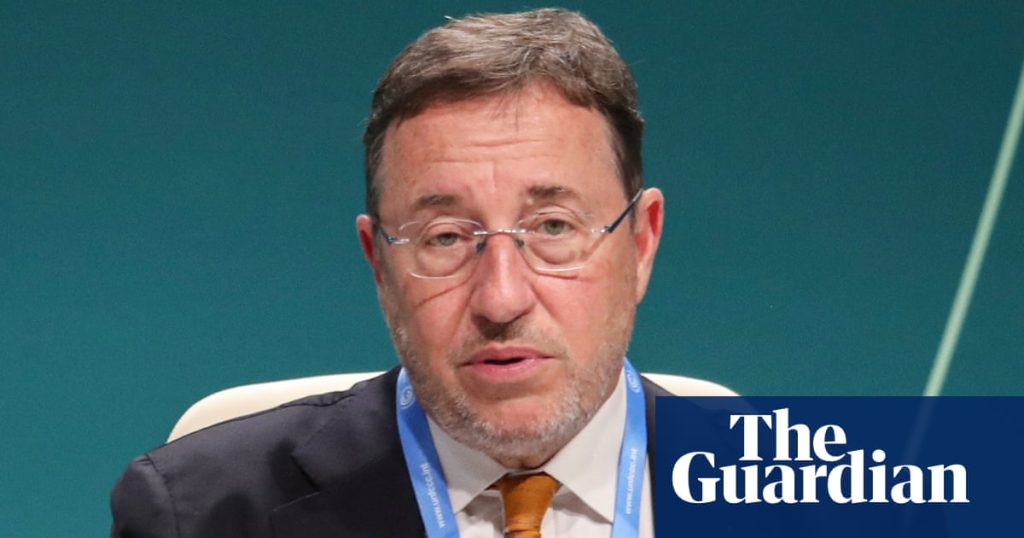Spending more on defence will be pointless unless western governments also tackle the climate crisis in poor countries, the UN’s departing chief of international development has warned.
“The more you restrict your ability to act by simply focusing on what’s happening inside your country, the more vulnerable you become,” said Achim Steiner, who recently completed his second term as administrator of the UN Development Programme (UNDP), which works on overseas aid and lifting people out of poverty. “Vulnerability can then very quickly translate into a very real crisis scenario.”
Many countries – the US, the UK and some EU member states included – are increasing their defence budgets, but sharply reducing their spending on international aid. Steiner said this was shortsighted.
“The more we defund [aid to and cooperation with developing countries], the more we lose the ability to act,” he said. “There is a loss of control, because you no longer can cooperate with countries that you depend on to solve these problems [such as the climate]. You are curtailing your own ability to create a more resilient national economy, in this world of interconnectedness.”
The climate crisis will potentially spiral out of control unless countries recognise their international obligations, he warned. “The greatest risk is not necessarily the territorial threat of a neighbouring country’s army, though that will always remain a potential risk,” he said. “It is cyberterrorism; the next pandemic for which we are not prepared; and most certainly the domino effect of runaway climate change.”
Governments should plan for the medium and longer term by viewing spending on climate finance for the poorest countries, and on development and cooperation with the developing world, in that light, perhaps even classing it under, or allied to, defence budgets.
“That kind of security perspective could make it much more justifiable that we have a defence and deterrence track in which we invest, but also a development and resilience track that by definition will have to have a strong international component, and both are ultimately integral to a national security strategy,” Steiner said.
A growing number of national security experts want governments to remodel their approach to climate breakdown, which has the potential to trigger problems that swiftly turn into security crises, such as migration and food price rises.
Donald Trump, the US president, has demanded Nato allies commit 5% of their GDP to defence, of which 3.5% would be on weapons and soldiery but 1.5% could encompass broader areas such as cybersecurity and infrastructure. The UK has pledged to meet the spending target by 2035, after raising the defence budget earlier this year to 2.5% of GDP, partly paid for by cutting spending on international aid from 0.5% to 0.3% of GDP.
Other countries are taking similar actions, but a few have proposals that could allow national security to be defined in a broader sense to encompass some “soft power” spending, on issues such as the climate or food security. For instance, Germany is expanding infrastructure alongside defence, with climate projects included. Spain is going further, earmarking €1.75bn (£1.5bn) of its defence budget for climate-related activities.
The UN is under almost unprecedented pressure, with the world at one of the most dangerous points in recent history, in Steiner’s view. The US has abruptly wound down its USAID agency, and is withdrawing cash from the UN and other multilateral institutions, while disabling domestic agencies that deal with the climate crisis. Other major developed economies such as the EU, Canada, Japan and the UK are also under pressure.
“We are at a moment of deep disruption,” warned Steiner. “The deep geopolitical and geo-economic tensions that are now playing out are in danger of paralysing cooperation and multilateralism. Development [in the form of overseas aid] is about prevention, investing in solving problems before they become deep schisms in society.”
The planet’s most important stories. Get all the week’s environment news – the good, the bad and the essential
Privacy Notice: Newsletters may contain information about charities, online ads, and content funded by outside parties. If you do not have an account, we will create a guest account for you on theguardian.com to send you this newsletter. You can complete full registration at any time. For more information about how we use your data see our Privacy Policy. We use Google reCaptcha to protect our website and the Google Privacy Policy and Terms of Service apply.
after newsletter promotion
He added: “Our international development agenda, our international institutions for cooperation, are now facing an almost unprecedented stress, not only in terms of the defunding, but also in terms of their ability to offer a way forward to the world in this very disruptive moment.”
In this new world, the poorest are suffering most. “We have seen reversals in development progress post-pandemic, with dozens of countries so heavily indebted that they’re essentially defunding their own development. They’re taking money from their health and education budgets and using it to service the interest payments of their national debt. They’re certainly unable to raise the capital to invest in the foundations of future development.”
Fixing that can only be done with a rethink of where countries’ real national interests lie, which requires taking a global view, he concluded. “The basic DNA of national security in our time must have a component that de-risks some of the threats that are, by definition, only reducible by international cooperation.”
A successor for Steiner, who was at UNDP from 2017 until this June after heading the UN Environment Programme, has not yet been appointed. Haoliang Xu, an under-secretary general of the UN, has been appointed acting administrator until a permanent successor is found.

